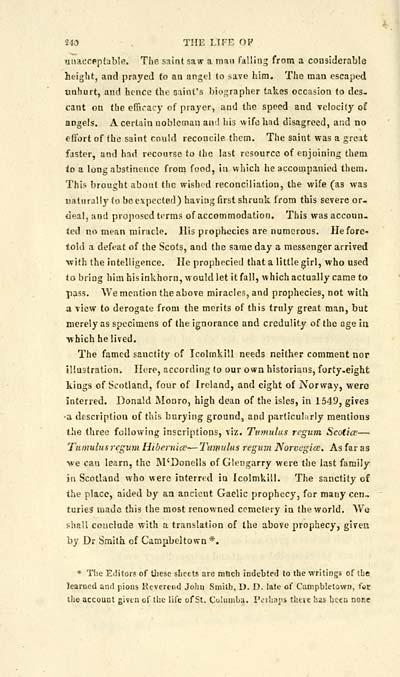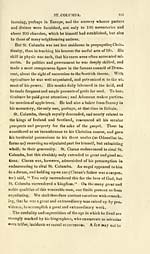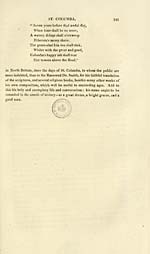Ossian Collection > Original collection of the poems of Ossian, Orrann, Ulin, and other bards, who flourished in the same age
(244)
Download files
Complete book:
Individual page:
Thumbnail gallery: Grid view | List view

249 . THE LIFE OF
tiiiaccepfable. The saint saw a man falling from a considerable
helglit, and prayed to an angtl to save him. The man escaped
unhurt, and hence the Gaint's biof;rapher takes occasion to des-
cant on the efiiracy of prayer, and the speed and velocity of
angels. A certain nobleman am! his wife had disagreed, and no
effort of the saint could reconcile them. The saint was a great
faster, and had recourse to the last resource of enjoining them
to a long abstinence from food, in which he accompanied them.
This brought about the wished reconciliation, the wife (as was
naturally to be expected) having first shrunk from this severe or-
deal, and proposed terms of accommodation. This was accoun.
ted no mean miracle. His prophecies are numerous. He fore-
told a defeat of the Scots, and the same day a messanger arrived
•with the intelligence. He prophecied that a little girl, who used
to bring him his inkhorn, would let it fall, w hich actually came to
pass. We mention the above miracles, and prophecies, not with
a view to derogate from the merits of this truly great man, but
merely as specimens of the ignorance and credulity of the age ia
•which he lived.
The famed sanctity of IcolmkiU needs neither comment nor
illustration. Here, according to our own historians, forty.eight
kings of Scotland, four of Ireland, and eight of Norway, were
interred. Donald Monro, high dean of the isles, in 1549, gives
•a description of this burying ground, and particularly mentions
the three following inscriptions, viz. Tumulus rcgum Scodce —
Tumulus rcgum Hibernice— Tumulus reguni Norvegice. As far as
■we can learn, the M'Donells of Glengarry were the last family
in Scotland who were interred in IcolmkiU. The sanctity of
the place, aided by an ancient Gaelic prophecy, for many cen,
turies made this the most renowned cemetery in the world. We
shall conclude with a translation of the above prophecy, given
by Dr Smith of Campbeltown *.
* The Editors of Uiese slietts are mtich indebted to the writings of tbe
learned and pions Keverend John Smith, D. D. late of Campbletown, foe
the account given of the life of St. Columba. PtMhaps there has been none
tiiiaccepfable. The saint saw a man falling from a considerable
helglit, and prayed to an angtl to save him. The man escaped
unhurt, and hence the Gaint's biof;rapher takes occasion to des-
cant on the efiiracy of prayer, and the speed and velocity of
angels. A certain nobleman am! his wife had disagreed, and no
effort of the saint could reconcile them. The saint was a great
faster, and had recourse to the last resource of enjoining them
to a long abstinence from food, in which he accompanied them.
This brought about the wished reconciliation, the wife (as was
naturally to be expected) having first shrunk from this severe or-
deal, and proposed terms of accommodation. This was accoun.
ted no mean miracle. His prophecies are numerous. He fore-
told a defeat of the Scots, and the same day a messanger arrived
•with the intelligence. He prophecied that a little girl, who used
to bring him his inkhorn, would let it fall, w hich actually came to
pass. We mention the above miracles, and prophecies, not with
a view to derogate from the merits of this truly great man, but
merely as specimens of the ignorance and credulity of the age ia
•which he lived.
The famed sanctity of IcolmkiU needs neither comment nor
illustration. Here, according to our own historians, forty.eight
kings of Scotland, four of Ireland, and eight of Norway, were
interred. Donald Monro, high dean of the isles, in 1549, gives
•a description of this burying ground, and particularly mentions
the three following inscriptions, viz. Tumulus rcgum Scodce —
Tumulus rcgum Hibernice— Tumulus reguni Norvegice. As far as
■we can learn, the M'Donells of Glengarry were the last family
in Scotland who were interred in IcolmkiU. The sanctity of
the place, aided by an ancient Gaelic prophecy, for many cen,
turies made this the most renowned cemetery in the world. We
shall conclude with a translation of the above prophecy, given
by Dr Smith of Campbeltown *.
* The Editors of Uiese slietts are mtich indebted to the writings of tbe
learned and pions Keverend John Smith, D. D. late of Campbletown, foe
the account given of the life of St. Columba. PtMhaps there has been none
Set display mode to: Large image | Transcription
Images and transcriptions on this page, including medium image downloads, may be used under the Creative Commons Attribution 4.0 International Licence unless otherwise stated. ![]()
| Early Gaelic Book Collections > Ossian Collection > Original collection of the poems of Ossian, Orrann, Ulin, and other bards, who flourished in the same age > (244) |
|---|
| Permanent URL | https://digital.nls.uk/77727489 |
|---|
| Description | Selected books from the Ossian Collection of 327 volumes, originally assembled by J. Norman Methven of Perth. Different editions and translations of James MacPherson's epic poem 'Ossian', some with a map of the 'Kingdom of Connor'. Also secondary material relating to Ossianic poetry and the Ossian controversy. |
|---|
| Description | Selected items from five 'Special and Named Printed Collections'. Includes books in Gaelic and other Celtic languages, works about the Gaels, their languages, literature, culture and history. |
|---|

